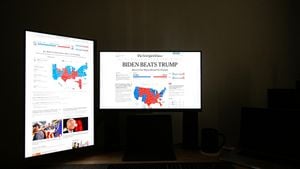Elon Musk has once again entered the spotlight with his latest move—a bold offer of $97.4 billion to acquire OpenAI, the company known for creating the revolutionary ChatGPT. This bid, revealed by Musk on Monday, is the culmination of longstanding tensions between the billionaire entrepreneur and OpenAI CEO Sam Altman over the future direction of the company.
The consortium led by Musk consists not only of his AI venture, xAI, but also includes several private equity firms like Baron Capital Group and Valor Management, aiming to wrest control of OpenAI, which was co-founded by Musk himself back in 2015. The proposal, confirmed by Musk’s lawyer Marc Toberoff, seeks to secure "all assets" of the tech company amid significant shifts within OpenAI’s operational strategy.
Sam Altman, who has been instrumental in OpenAI's rise to prominence, responded swiftly to the bid via the platform X, stating, “No thank you but we will buy Twitter for $9.74 billion if you want.” The quip highlights the contentious history between the two men, who were once partners with compatibility but have since diverged significantly on strategic priorities.
Underlying Musk’s offer is his insistence on restoring OpenAI’s original nonprofit ethos, which he claims has been compromised through its recent move to transition toward profit-driven motives. "It’s time for OpenAI to return to the open-source, safety-focused force for good it once was. We will make sure this happens," Musk declared, shedding light on the philosophical conflict at the heart of this acquisition attempt.
OpenAI has suggested this for-profit transformation is necessary for securing the funding required to compete effectively within the rapidly advancing AI sector, which has seen unprecedented investments and innovations. The organization is said to be restructuring to facilitate access to major capital sources, indicated by its skyrocketing valuation—reported to be at approximately $157 billion during its last funding round—and speculated to reach $300 billion.
Taking control of OpenAI could shift the balance dramatically within the industry. The proposed sale follows Musk's earlier lawsuits against OpenAI, where he accused the leadership of deviancy from the original mission intended to prioritize humanity’s interests. “If Sam Altman and the present OpenAI, Inc. Board of Directors are intent on becoming a fully for-profit corporation, it is important the charity be fairly compensated for what its leadership is taking away from it: control over the most transformative technology of our time,” Toberoff noted, underscoring the stakes involved.
The backdrop to this acquisition attempt is set against the backdrop of other significant developments around AI technology and infrastructure. OpenAI, famous for its substantial contributions to mainstream AI applications, is maintaining partnerships and connections with corporate players like Microsoft as well as new ventures like the Stargate Project, which aims to construct comprehensive AI frameworks across the U.S.
Musk's consortium appears poised to contest any counter-bids arising as it has publicly stated its readiness to match or exceed offers from other investors interested in OpenAI. This battle symbolizes not merely the clash of titans but also raises questions about accountability, purpose, and the overarching vision for AI’s future.
With the tech industry watching closely, both Musk's intentions and Altman's moves could redefine the possibilities of artificial intelligence. The rapid evolution from nonprofit focused company to one with commercial ambitions brings up fundamental discussions about ethics and safety versus growth and profit.
The uncertain future of OpenAI now hinges on the response from its board and stakeholders, testing the resolve and vision of its leadership as they navigate through this pivotal moment. The consequences of Musk's offer could alter the dynamics of artificial intelligence development, forcing all parties to reconsider their positions as they head toward decisions affecting billions of dollars and, potentially, the future of AI itself.



